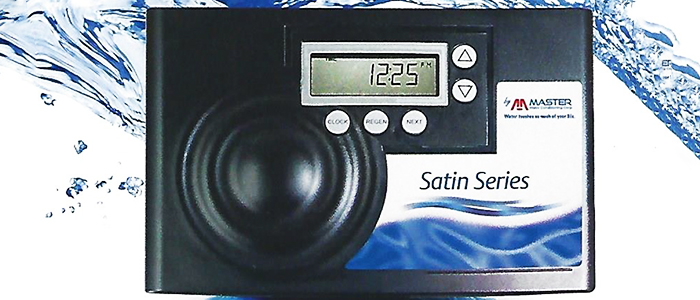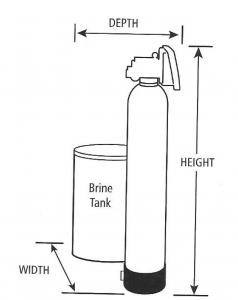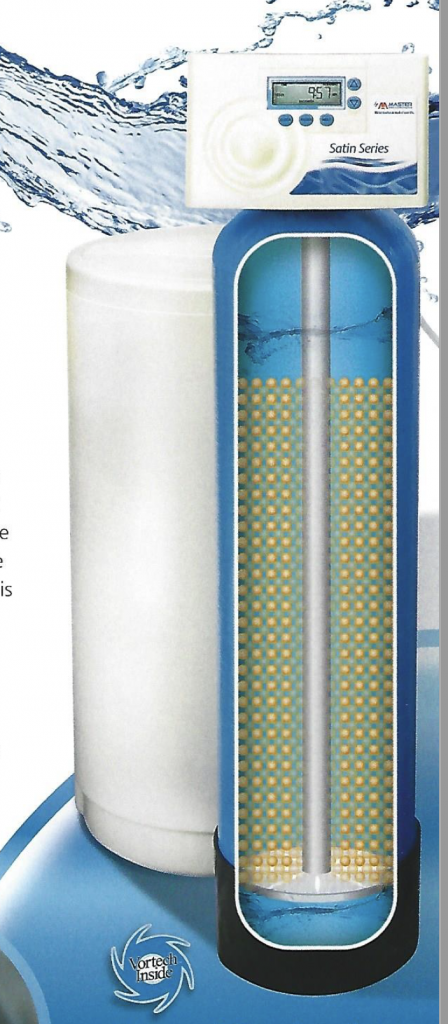Do I Need A Water Softener?

When you have a water test done, you will receive a water report analyzing several aspects of the water; one of which is hardness. Your water should be less than 4 grains per gallon (gpg). If your water tests higher than this, this is an indication that you have hard water. The typical treatment for hard water is installing a water softener. There are several signs of hard water that may lead you to suspect that you have hard water, before even receiving your water report.
- Scale Buildup On Appliances – Hard water can lead to mineral deposit formation on coffee pots, shower heads, sinks, etc.
- Dry Skin – Hard water can lead to itchy and dry skin because of all the extra calcium and magnesium salts in the water. These salts dry the skin, instead of nourishing it.
- Faded Clothing – You may notice your clothing coming out of the wash a bit faded in color or having a gray appearance. They may even feel scratchy or hard. This is again due to the high concentration of minerals in your hard water.
- Deposits In Sinks Or Tubs – Chalky/plaster looking deposits will likely be left behind in your sinks or tubs if your water hardness is above the recommended level.
- Plumbing Repair Needed Too Often – This buildup of minerals and limescale can be damaging to your pipes. Especially if your pipes are steel, as they are easily injured from this sort of buildup. Buildup of any kind within your pipes can lead to a restricted flow and thus lowered water pressure.
- Brittle Glassware – Not only will you notice water stains on your glassware from hard water, but believe it or not, it can also make them more brittle leading to easy breaks.
The best solution for hard water, and the issues that come with it, is to install a water softener.
If you have noticed any or all of these symptoms of hard water listed above, the answer to your question, ‘Do I Need A Water Softener’ is likely, Yes.
How Does A Water Softener Work?
 A water softener works on the general principle of trading the minerals for something else, usually sodium. This process is typically called ion exchange. Within a water softener system, there is a mineral tank that is filled with small polystyrene beads which carry a negative charge. Calcium and magnesium carry positive charges, so these minerals cling to the negatively charged beads. Hard water will move into the mineral tank and the calcium and magnesium move to the beads, as sodium ions enter the water. The water softener will then begin the 3-phase regeneration process. By conditioning hard water through this ion exchange process, calcium and magnesium are reduced, and the water is softened.
A water softener works on the general principle of trading the minerals for something else, usually sodium. This process is typically called ion exchange. Within a water softener system, there is a mineral tank that is filled with small polystyrene beads which carry a negative charge. Calcium and magnesium carry positive charges, so these minerals cling to the negatively charged beads. Hard water will move into the mineral tank and the calcium and magnesium move to the beads, as sodium ions enter the water. The water softener will then begin the 3-phase regeneration process. By conditioning hard water through this ion exchange process, calcium and magnesium are reduced, and the water is softened.
At Kulk’s Plumbing & Heating, we install Master’s Water Satin Series Water Softeners. Some features of the Satin Series are:
- Smart Valve Technology
- Vortech Smart Tank Technology
- Fully Adjustable Timer Settings
- Optional Second Backwash
- Factory Programed Control Valve
- Optional Regeneration Times (can be set to regenerate on demand or at a specific time)
- Time/Date retention for up to 8 hours during power failure

Benefits Of The Satin Series Water Softener:
- Reduces scale and improves flow in pipes, fittings, fixtures
- Reduces additional dissolved substances
- Saves money on appliance life
- Highly efficient water optimization requiring low salt usage
- Improves cleaning
- Easy to program and reprogram if water conditions change
A Water Softener Can Save You Money:
Softer water is more efficient, meaning that you will save in energy bills. As little as 1/8th of an inch of hard scale on a water heater element will reduce heating efficiency by 20%. By installing a water softener, you can reduce your cost in energy bills.
If you suspect that you have hard water, it may be time for you to have a water test done. If it is determined that your water is in fact harder than desired, we can help to select the best water softener for your home as well as properly install it. Contact Kulk’s Plumbing & Heating today to schedule your free water test.

